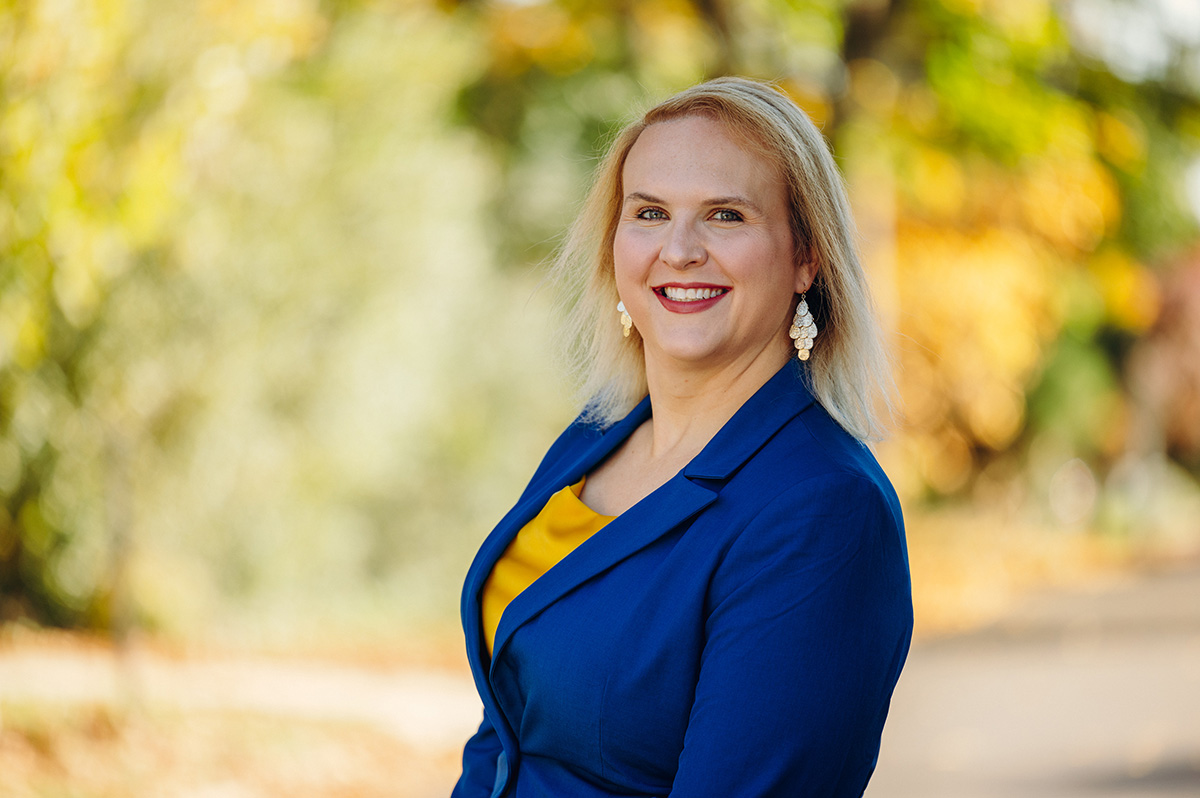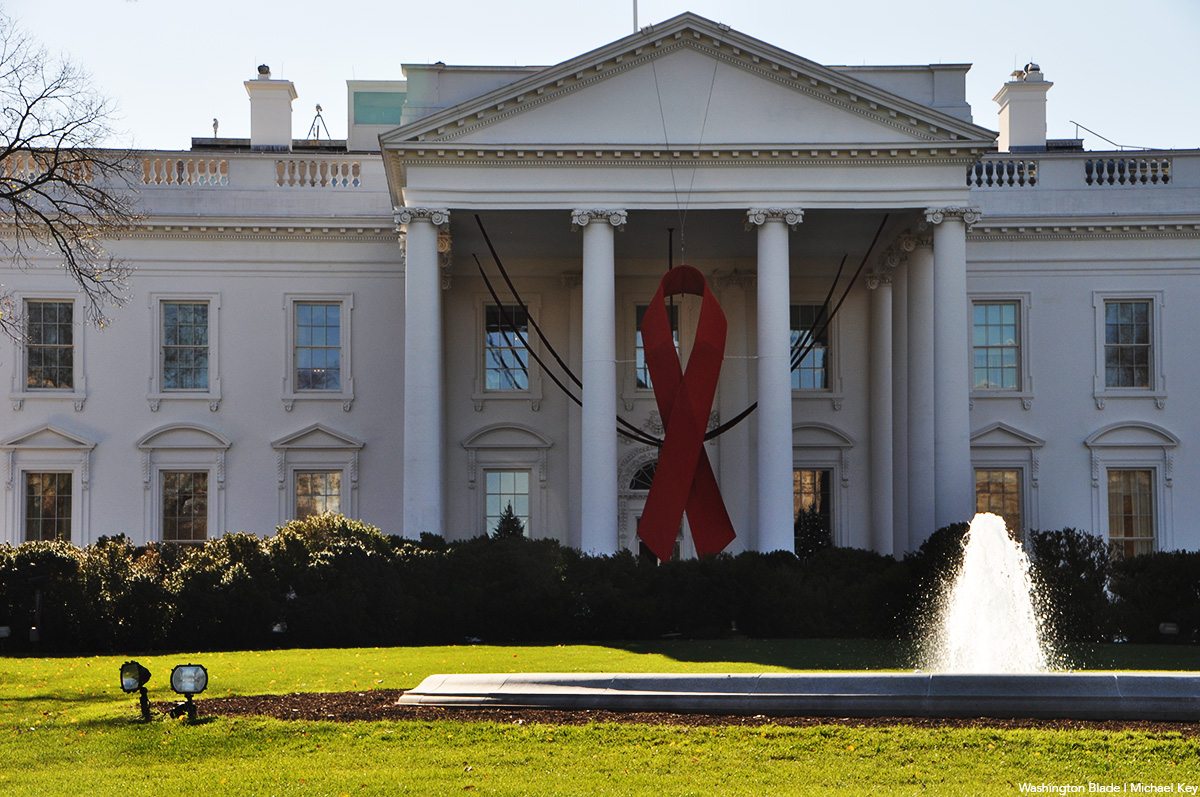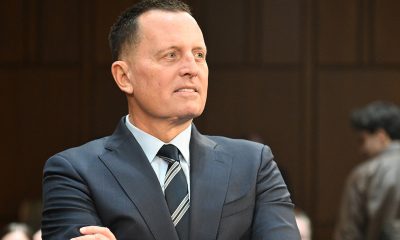News
Log Cabin urges Dave Agema to resign
Gay GOP group calls for committee member’s ouster after anti-gay comments


Log Cabin is calling on Dave Agema to resign from RNC after saying gays want free health care because they’re dying of AIDS.
Pressure is increasing on Republican National Committee member Dave Agema to resign after he delivered remarks saying gay people are claiming HIV-positive partners to obtain health care.
The Log Cabin Republicans and the Log Cabin Republicans of Michigan jointly issued a statement on Friday calling for Agema’s ouster on the grounds that he’s imperiling Republican success at the ballot.
Gregory Angelo, executive director of Log Cabin, said resignation is the only appropriate action for Agema in the aftermath of his anti-gay remarks.
“One word: resign,” Angelo said. “Dave Agema has repeatedly shown that he is unfit to represent the many good Republicans in Michigan who understand that his brand of ‘conservatism’ isn’t doing the party any favors.”
Agema has been under fire for remarks he reportedly made at a local Republican Party holiday reception last week in Berrien County. According to the Herald Palladium, Agema said he’s seen gay people working for American Airlines claim to have HIV-infected partners to obtain spousal health coverage.
“Folks, they [gay people] want free medical because they’re dying between 30 and 44 years old,” Agema was quoted as saying. “To me, it’s a moral issue. It’s a biblical issue. Traditional marriage is where it should be and it’s in our platform. Those in our party who oppose traditional marriage are wrong.”
According to Log Cabin, there’s currently no mechanism to remove a Republican committee member in Michigan, but the Michigan Republican Party can amend its bylaws to allow for the removal of members who harm Republican prospects of winning elections. Short of that, Log Cabin wants Agema’s colleagues and RNC Chair Reince Priebus to insist he step down.
The Michigan Republican Party will have an opportunity to address the call for Agema’s resignation over the weekend at a Michigan Republican Party state committee meeting. According to the Associated Press, Jason Watts, an activist from Western Michigan, will propose a resolution not mentioning Agema by name, but disavowing the party of “demagogic rhetoric that is incendiary and unbecoming of civil discourse.”
Agema has a history of taking on anti-gay positions. He was responsible for introducing a resolution before the Republican National Committee that reaffirmed the party’s opposition to same-sex marriage. Agema has also compared being gay to being an alcoholic.
Agema, the Michigan Republican Party and the RNC did not respond to the Washington Blade’s request for comment on Log Cabin’s call for Agema’s resignation.
Agema’s remarks have already been condemned by Michigan Gov. Rick Snyder, Michigan Republican Party Chair Paul Welday, Michigan House Speaker Jase Bolger and Senate Majority Leader Randy Richardville.
Joe Sylvester, chair of Log Cabin Republicans of Michigan, said the Michigan Republican Party must find a way to take action against Agema.
“The Michigan Republican Party is acting as if it is helpless in this situation by saying that there is nothing that they can do about it,” Sylvester said. “It’s just a ploy. They are deflecting and hoping the issue goes away. They can do something about it and they should.”
Pennsylvania
How Pa.’s first trans mayor-elect used a ‘good neighbor’ campaign to win
Erica Deuso made history on Nov. 4

Uncloseted Media published this article on Nov. 18.
By SPENCER MACNAUGHTON, SAM DONNDELINGER, and TAYA STRAUSS | On Nov. 4, Erica Deuso made history when she became the first openly transgender mayor-elect of Pennsylvania, a milestone for inclusive political campaigns. Deuso won nearly 65 percent of the vote and was part of a great night for Democrats, with Zohran Mamdani, Abigail Spanberger and Mikie Sherrill all winning their races in New York City, Virginia and New Jersey, respectively.
Three days after she was elected, Uncloseted Media spoke with Deuso about how her political campaign strategies — which included focusing on “good neighbor” issues rather than on her gender identity — pushed her to win big.
Spencer Macnaughton: Hi everyone, I’m Spencer Macnaughton. I am joined today by Mayor-elect Erica Deuso. She is a scientist, advocate and community leader who was just elected as mayor of Downingtown, becoming the first openly transgender mayor in Pennsylvania. Mayor-elect, thank you so much for being here today.
Erica Deuso: Thank you for having me.
SM: So let’s get right into it. You won and you made history in Pennsylvania. How are you feeling?
ED: It was a very long day but we were very happy to see the results. It was a clean sweep here in Chester County. All of our statewide won, all of our countywide won, and very many of our local municipal offices won too. So we’re very pleased with that. As for me, I’m feeling a little bit overwhelmed. I looked at this as being “I’m running for mayor. I’m running to be the mayor of a small town in Pennsylvania,” and I looked at this as I knew the history, but I didn’t really know how big it was going to be. And then I took Wednesday off to sort of relax and recharge, and that’s when I started getting all the requests for interviews and talking points, phone interviews, in-person interviews, Zoom interviews. I underestimated how big this would be. So, I’m humbled by all the reactions and I’m ready to get to work.
SM: What do you mean you were surprised by how big this would be? What surprised you about the reaction?
ED: Well, you know, I’ve always looked at it like “I’m a scientist. I’m a businesswoman. I’m a sister, a daughter, a wife.” You know, my gender identity, myself, I don’t think about it. You know it’s been 16 years since I transitioned. So it’s not something that’s really front of mind for me anymore. And so, I came in this thinking I was gonna run on local issues: traffic, housing affordability, flooding mitigation, public safety. And that’s what I ran on. So coming into Tuesday, I knew the history, but I also knew that I didn’t run on my gender identity. And I was hoping that people around Downingtown would feel very much the same way. That they care about the kitchen table issues that face small towns all around this country. And so to see the outpouring of love and respect and just people calling from all over the country, people calling from all over the world, it’s very, very humbling to me. And I say that with as much gratitude as I can.
SM: Fantastic! And for those who don’t know, since we have a national audience, Downingtown is a small, predominantly white town of roughly 8,000 people, located in Chester County, west of Philadelphia. It typically swings Democratic, and its historical roots are in industrial and mill, as an industrial mill town, and it has a higher average household income than the national average, and typically swings Democrat. But I wanna know, what does Downingtown mean [to] you? How would you describe this town that just elected you as their mayor-elect?
ED: Well, very much like a lot of small towns, the town is defined by the people, you know? We have something very that we’re very proud of and that’s this good neighbor spirit where everybody comes out and helps everybody else. So when there’s a family in danger of poverty or housing issues, we come out as a community and support them. We had an individual who was abducted by ICE, and we’ve thrown rallies and raised money for the family, and we’re making sure that the family has what they need as far as money, food, housing, while the family patriarch is in ICE custody. When we had flooding, Hurricane Ida in 2021, historical flood, we started a program called Downingtown Strong. So we have this good neighbor spirit and that comes from the people, not the town itself. The town could be anywhere, but the people of Downingtown will always be what makes this town special.
The political campaign strategies behind Deuso’s Win
SM: And I hear you say multiple times, “good neighbor,” and I know that almost has been the slogan of your campaign, right? Tell me more about the political strategy behind the idea of branding your campaign as somebody who looks out for the good neighbor.
ED: So when I first moved here in 2007, it was before I transitioned. It was back in the aughts and people were still being discriminated [against] probably more than today. It just wasn’t news. And I was very scared. I was scared of what my neighbors would think, scared of what the town in general would think. The outpouring of love and support when I went through my transition was just amazing. So I look at this as giving back to the people who made me feel at home, made me feel welcome, even through the toughest part of my life. And I think when it comes to building my campaign, that’s where it was centered, is that I was trying to give back. Trying to thank the town for being there for me by saying that I’m going to be there for you.
SM: That’s beautiful. And take me back to when you did come out publicly. Do you have any kind of concrete examples that you can point to of when you remember the community coming around for you?
ED: So,I had a neighbor who lived across the street from me. I had just come out. She didn’t know. She knew me, but she didn’t know me well. So as I’m starting to come out, my hair’s getting longer, I’m dressing differently, I’m trying out new names and things like that. And it was wintertime. She came out, we helped shovel out her car because she needed to get to work. And she asked me, “Hey, you know, what’s going on? I’ve seen a bunch of changes, but I don’t know what’s going on.” So I told her. And she’s like, “If you need anything, if you need me to stick up for you in town, if you need me to take you to a doctor’s appointment, if you need anything, just let me know.” And it was maybe a week later, we were out together, we grabbed some coffee and somebody, when I went and gave them my name, they called out, they just said, “Eric.” My friend, my new friend, who had known me basically for a week, goes up to the counter and says, “It’s Erica, get the name right.” And they turned, you know, they blushed. They said, “Oh, we’re so sorry, we got the name wrong” and everything. And I’ve never had a problem with that coffee shop since. It’s those sort of things where it’s just, if somebody misgenders you, if somebody dead names you, my community has my back.
SM: Having those people who have your back and stand up for you, Downingtown community members, how does that make you feel on an emotional level? What does it do for your mental health?
ED: It makes me feel at ease, you know. It makes me feel less tense, less anxiety. When you’re first coming out, you’re taking those first steps with trepidation. You’re wondering, “Is today going to be the day that someone’s going to call me a man? Is today the day where somebody’s going to call me out for using the bathroom at the McDonald’s, or who’s going to laugh at the way that I’m dressed or my makeup or something?” And to know that people have my back, to know I have friends and community members who are there to support and understand and learn and grow with me, that means everything because it made transition so much easier.
SM: And, you know, obviously Downingtown sounds like they’ve been an amazing support, most of the members. But I’m sure not everyone is supportive. And I’m sure you’ve met some people and interacted with people who maybe have never met a trans person before while you were campaigning. What did you find through your campaign worked the best in accessing people who may be misinformed about trans people, who may have never met a trans person and who could never imagine a trans person as their elected leader? What were the kind of tools that worked the best from a communication strategy point of view?
ED: Humor. Humor always works the greatest. I remember going to somebody’s door and a woman came to the door. She said, “Oh, I’m not voting for him.” And I’m like, “Who are you — there’s no hims around here.” And she said, “Oh, I thought you were a man.” And I’m like, “Nope, no, I haven’t been a man for 16 years. You know? And even then that’s questionable.” And she started to laugh. And I said, “Right now, I’m just worried about our town. I’m worried about the traffic on our street here. You know, we have this new development up the street, it empties right onto your street here. What’s going on with that? How has that affected you?” And she said, “Well, to be honest, it’s been a pain because I need to get to work right around the time that the kids are getting picked up from school. And it’s tough because now I have to wait for all the traffic and then the school buses.” And just by using that little bit of humor at the beginning, it bridged that gap. It made me be able to have a conversation with this person who originally had just dismissed me out of hand.
SM: And it probably disarmed them and opened up a door for them to feel comfortable enough to ask you questions they might not be sure they can ask.
ED: All too often you see trans people being labeled as angry or upset or you’re going to trigger them by using a name or using a pronoun that they don’t agree with. And, to me, I just look at it from a point of humor and be able to disarm people through a little bit of humor, a little bit of good nature, and not taking things so seriously. Because at the end of the day, we’re all in this together. And if I can use a little bit of humor to disarm a situation and do some education, that’s far easier than coming at it from a place of anger or being upset.
SM: That’s so interesting. Any other strategies that you found worked?
ED: Just focusing on the issues has been the biggest thing. The other side of the aisle, people who want to bring hate and division into this town, came at me trying to make this campaign about my identity. They tried to find anything that I would post, like when I was endorsed by groups like Advocates for Trans Equality or the Victory Fund or LPAC. I would post things on social media saying, “Hey, I’m really proud to have been endorsed by these groups.” And they would take that as, you know, I’m trying to shove gender ideology on them. When in fact, it’s really just [that] we have a robust LGBTQ community in Chester County. And here in Pennsylvania, we have about 71,000 trans people. I want to make sure that they’re represented. And the rabble rousers, the people trying to push against me, tried to make this divisive about my gender. But it didn’t really work when all I’m talking about is public safety, traffic and flooding.
What political outreach means for Deuso
SM: I think what you just said is kind of a micro representation of the strategies that worked in many other elections this week, right? Where you found, you know, Mayor-elect Mamdani of New York City focusing on affordability, but at the same time not ditching trans and queer people along the way. At the same time, we have the federal government winning from being hateful toward trans people. In my opinion, as somebody who looks at this all day, we’re reaching a precipice among the American populace where they’re starting to realize the BS of all of this misinformation and starting to recognize that “I don’t have to vote for a politician just because they’re against a group. I can actually care about the issues” kind of thing. Does that track?
ED: It does. I mean, if you look at the campaigns of Mayor-elect Mamdani, Governor-elect Spanberger, Governor-elect Sherrill in New Jersey, the anti-trans ads did nothing. I had somebody circulate a letter a couple days before the election saying that the flooding issues that I had were garbage, saying that I was misleading people with my gender identity. And they brought it around town through our local Turning Point Action group here in Chester County. They had middle schoolers running these letters and putting them on people’s doors and under placemats. The reaction to that was, “This is awful to a person around town.” I heard literally hundreds of people at the polls tell me, “You know, I wasn’t going to come out and vote today but getting that letter brought me out and not for what they thought it was going to do.” Um, I think people are just starting to see LGBTQ people, immigrants, people of other races, ethnic backgrounds, that didn’t scare people off the way that the opposition thought it was going to scare people off. We’re moving to a place where if a person is the most qualified person, I think people want that. And it starts up at the top. People are seeing that maybe we didn’t elect the most qualified person to be president right now. All these things that the current administration wants to do just to make some people’s lives harder is turning a lot of other people off. So if we focus on the things that really matter to the American people, to the people of Downingtown, the people of Pennsylvania, I think that’s what’s really gonna win people. If you compare somebody’s health care premiums to whether or not someone’s transgender, I think they’re gonna be more worried about the health care premiums at this point.
Pa. governor election: the bigger picture
SM: So fascinating, and I think all of that resonates. And I think a lot of Americans are ready to just care about the issues and tackle the issues specifically. With that said, you are making history, right? As Pennsylvania’s first openly transgender mayor, what does that mean for you? How are you gonna balance focusing on the issues while also honoring this history that you’ve made?
ED: So it means a lot to me, my own gender identity. I’m so happy to be able to represent our community in this situation, but there’s a lot to do. The mayor of Downingtown’s major responsibility is working with the police, to make sure the police have what they need to do the job that they need to do. Working as mayor, I’m gonna make myself accountable, I’m going to make myself available. We’ve never had office hours here for a mayor, so I’m gonna set up office hours. I will be there to talk to you, listen to you, understand what the problems are — sorry, there’s a little bug — understand where the problems are in town.
SM: Obviously you’re courageous, but are you afraid in any ways being in this elected position, given how much animus there is towards the trans community right now in America?
ED: I was. At the very beginning of this, right after the primary, and it was a landslide. So that made a lot of people happy, but at the same time it really made some people unhappy. And there was some chatter, there were some potentials for violence. And we made sure that when we had some events this summer and this fall that we were doing our best to make sure we were protected. And we had two security people at a Fall Fest that we had here where people knew where I was going to be at every minute of the day, that day, and this was weeks after the Charlie Kirk assassination. And just because of the use of firearms, it was such an open place, I did invest personally in some protective armor underneath my clothes for that. Thankfully, we didn’t need it. So, we were safe with that. But still, we kept security in mind. Thankfully, there was no violence to speak of. Just a lot of people speaking out of a place of ignorance and misunderstanding.
SM: You’re saying armor, you wore a bulletproof vest?
ED: Yes.
SM: Wow, and I’m guessing you wouldn’t have done that and you wouldn’t have hired security if you weren’t transgender, is that fair?
ED: That is fair. This town leans Democratic. I’m not worried about a lot of the majority of the people of this town. And really the people of this town who could vote in the borough were not the problem. It was people from the outlying areas of this town, the townships that surround us. That’s where a lot of the divisiveness and people trying to force this campaign to be about my gender. That’s where they came from. We couldn’t really control them very well. So we just need to prepare for every eventuality.
SM: Obviously, there’s been transphobic comments on social media as there always are. Sometimes you’ve been responding and sometimes you haven’t. What’s kind of behind the decisions of when to engage and when to leave it?
ED: So I think when some of these comments come from a place of ignorance, there’s an opportunity for education. I remember one comment where somebody said, “You wanna just chop off your genitals” and things like that. And I said, “Look, if you follow the WPATH guidelines, everything starts with mental health,” and they came back and said, “I had no clue that there was this much involved with it.” To know that, yeah, they may disagree with it still, but at least they have a better understanding of the process and it isn’t just, somebody wakes up tomorrow and decides that they wanna go have surgery. It doesn’t work that way. And for other reasons, I don’t want a kid [or] another trans person to see my posts, see all the hate, and then not see me push back against it, you know? I don’t want them to think that I’m just gonna sit back and take it when other people in power are telling me, “You can’t use this bathroom,” or “You have to change your passport or your driver’s license or something that you have to change it back.” No, I’m not going to just stay silent because that trans kid is looking at me. They’re looking at me for leadership. And if I just stay silent on those sort of things, that person’s thinking, “Well, there’s no one standing up for me.”
SM: You must feel like you have a duty to engage.
ED: Exactly, that’s how I feel about it, is that, you know, when there’s something, you have to push back against it because there’s always people watching.
Pa. governor election and national political trends
SM: What would you say to politicians at the highest level of government in America right now who are stoking this fire of transphobia and anti-trans animus?
ED: Let’s have a conversation. I think if we can find 5 percent of an issue where we can agree on, I think we can build on that. Let’s bring the temperature down on LGBTQ issues. Let’s stop worrying about whether or not someone can change the letter on their passport. And let’s have a conversation about how best we can treat everybody as Americans. And as equals.
SM: And you would sit down with the Donald Trumps and the other people to talk about that? You would be open to that?
ED: If there was somebody who was willing to have an actual conversation where we could find common ground and build on it, I would sit down with anybody. That said, if I know that it’s not turning into a good-faith argument, that conversation is going to be over, and we’ll find somebody else who will have a good-faith conversation.
What it means to be a trans politician in today’s climate
SM: I want to go back to little Erica. At what age do you think you realized you were trans, and tell me a little bit about those early realizations.
ED: So, I believe I was 4. It was very early on, but that was 1984, at a time when people didn’t know anything about this. My parents obviously didn’t know anything about it. I lived with that for six years, knowing that I didn’t have the language, I didn’t have the verbiage, I didn’t understand what was going on. It was a time when kids didn’t go to therapists. And so I waited until I was 10 to tell my parents. And, obviously, it was 1990, and things didn’t go over well at that point. It wasn’t something they knew anything about and they came at it from a place of fear, not understanding. So I sort of shoved it down a little bit, and then college came around and I tried to do something about it again in college when I was 19. And I met my ex on the way to therapy. So put it on the shelf again. And it wasn’t until I was 29 that I realized, “Hey, I don’t wanna turn 30 and not know who I really am.” So I went to a therapist who specializes in gender identity and gender dysphoria here in the area. And by the end of the first session, she said, “I don’t think I’ve met another person who fits as many criteria for this as you do.” So we started on the path. I did get amicably divorced from my ex. Still friendly. I’m very happy for her. She has a very cute little girl, happily married again. I’m happily married now again. And life is good. And very, very happy with the way things happen. And everything happens for a reason. And I firmly believe that I’m living this life for a reason. Maybe it’s to be the mayor. Maybe it’s for something greater. Who knows? But right now I’m focused on being the best mayor Downingtown has ever had.
SM: What would your message to young kids be who might have dreams of being mayor or other, you know, amazing career paths, but aren’t sure if they can be out and proud and do these and achieve these ambitions?
ED: You will surprise yourself with what you’re capable of once you say that “I’m going to just be myself, no matter what anybody else says.” There will always be people who push you to be different, whether you’re trans or not, but you have to persevere and say, “This is who I am. This is what I’m going to do with my life,” and just keep pushing because you only have one life, and you need to live it in the way that’s going to bring you the most joy and the most happiness and be the best for yourself.
SM: What are you most excited [about] when it comes to getting to work?
ED: Well, I want everybody to know, who voted me in, that I’m eternally grateful for the responsibility that you have given me. I’m not gonna let you down.
SM: Fabulous. Well Mayor-elect Deuso, I think you should be very proud. You’re a role model overnight, kind of, which might have even surprised you. And I wish you the best of luck as Mayor of Downingtown. Thank you so much for speaking with me and Uncloseted Media today.
ED: Thank you so much for having me, and my door’s always open.
District of Columbia
New LGBTQ bar Rush set to debut this weekend
14th & U picks up a queer lounge, dance spot with a tech focus

The LGBTQ nightlife hotbed at 14th and U is about to get another member. Rush, a bar years in the making, is set to open its doors this week.
Filling the hole left by Lost Society, Rush will be a tech-forward, two-story bar featuring fully integrated light and sound to deliver “an immersive experience,” according to owner Jackson Mosley.
Mosley began conceptualizing such a bar back in 2017. His career linking tech and hospitality stretches even further back, beginning his career at LivingSocial and Uber. And even before that, he moonlighted at Town during his college years, where he developed a passion for drag and LGBTQ nightlife.
Rush is this manifestation of both tech and nightlife coming to fruition, but it hasn’t been without setbacks. Mosley originally planned to open farther east, on 9th and U streets, but received pushback from the building in which it was supposed to be housed. “It was the universe telling me it wasn’t the right spot,” he says. Earlier this year, coming across the Lost Society vacancy, Mosley finally found his host. As the center of LGBTQ nightlife has shifted to 14th Street – as reinforced by this week’s Shakers shuttering – Mosley was eager to join the festive fray.
Rush is in the same building as Bunker, settling on the top two levels of the structure. Across a flexible, indoor-outdoor combination and 6.000 square feet, Rush entirely shakes up its two floors – “a real reimagining so that it feels entirely new,” he says, with new equipment and a new vision and a capacity of at least 300.
The lower floor leans into a lounge vibe. Relaxed seating and a huge bar dominate the area. It will feature a sound booth, furniture with built-in lighting, and plenty of places to chat.
Upstairs is the club, dance-forward space. It has a “proper drag stage,” Mosley says, one of the largest among fellow LGBTQ bars, at 7.5 feet deep by 22 feet wide. Set up for live performances and painted in matte black, this rooftop level can open the doors to the deck allowing the entire level to participate in performances.
Rush will also boast a full kitchen, distinct from many other LGBTQ bars. Set to start serving in a couple of months, it will serve a large menu of bar food and more, as well as a lively brunch on the rooftop.
“It’s long overdue to have a brunch with good food at a bar,” he says.
Mosley emphasizes sound and lighting as part of his tech focus. Dropping more than $150,000 on this multi-sensory experience, he realized his “life dream to build out a sound system I love,” he says. “Enough lighting to power Echostage,” he joked. Lasers, hazers, smoke machines, and CO2 cannons are just a few elements. “One piece lacking at a drag show has been integrated light and sound with the performers’ choreo,” he says, like when a queen performs a death drop, there should be a light and sound crescendo.
Rush also differentiates itself with its unique business model. All Rush employees are full-time exempt with benefits like healthcare and PTO. Mosley takes up the CEO position of his firm Momentux, which will operate Rush. Mosley envisions growth to open Rush locations in other cities along the same model. Patrons will swipe their credit cards at the door, reducing the number of swipes for bar staff (and reducing credit card fees), and wear wristbands to track purchases. The approach negates the need – and request – for tips. Service charges will only be levied when patrons don’t close their tabs. “I’m rethinking the role of staff, down to the barback,” he says.
As for what the staff will pour, Rush will slowly roll out an eclectic, cheeky signature cocktail list to be served beyond the usual vodka-sodas. Such drinks might include the “14th & Unhinged,” with tequila, mezcal, tamarind, and lime; the “Power Vers,” with gin, elderflower, lemon, and pink peppercorn foam; and the “Flight Attendant,” which comes with a spread based on the ever-popular in-flight cookie, Biscoff.
The bar’s opening is set for Saturday Nov. 22, with a promising lineup — popular DJ Sidekick, and a trio of local drag favorites: Cake Pop, Druex Sidora, and Mari Con Carne. A social media post promised “good energy, controlled chaos, and hot strangers.”
Rush, says Mosley, might be like “if Taylor Swift and Lady Gaga had a baby, plus drag queens,” he says.
Eswatini
PEPFAR delivers first doses of groundbreaking HIV prevention drug to two African countries
Lenacapavir now available in Eswatini and Zambia.

The State Department on Tuesday announced PEPFAR has delivered the first doses of a groundbreaking HIV prevention drug to two African countries.
The lenacapavir doses arrived in Eswatini and Zambia.
The State Department in September unveiled an initiative with Gilead Sciences to bring lenacapavir “to market in high-burden HIV countries.”
Lenacapavir users inject the drug twice a year.
The State Department in its September announcement noted everyone who participated in Gilead’s clinical trials remained HIV negative. It also said lenacapavir “has the potential to be particularly helpful for pregnant and breastfeeding mothers, as it safely protects them during and after pregnancy to prevent mother-to-child transmission.”
“In our new America First Global Health Strategy, the Department of State is establishing a first-of-its-kind innovation fund to support American-led research, market-shaping, and other dynamic advancements in global health,” said PEPFAR on Tuesday in a press release.
“The arrivals of the first doses of lenacapavir in Eswatini and Zambia mark an important milestone in HIV prevention and reflect our commitment to supporting communities with the greatest need,” added Gilead CEO Daniel O’Day. “For the first time, a new HIV medicine is reaching communities in sub-Saharan Africa in the same year as its U.S. approval.”
The September announcement came against the backdrop of widespread criticism over the Trump-Vance administration’s reported plans to not fully fund PEPFAR and to cut domestic HIV/AIDS funding. The Washington Blade has previously reported PEPFAR-funded programs in Kenya and other African countries have been forced to curtail services or even close because of U.S. funding cuts.
-

 District of Columbia2 days ago
District of Columbia2 days agoD.C. LGBTQ bars ‘hanging in there’ amid tough economy
-

 District of Columbia3 hours ago
District of Columbia3 hours agoNew LGBTQ bar Rush set to debut this weekend
-

 National2 days ago
National2 days ago213 House members ask Speaker Johnson to condemn anti-trans rhetoric
-

 Movies5 days ago
Movies5 days agoIn solid ‘Nuremberg,’ the Nazis are still the bad guys



















